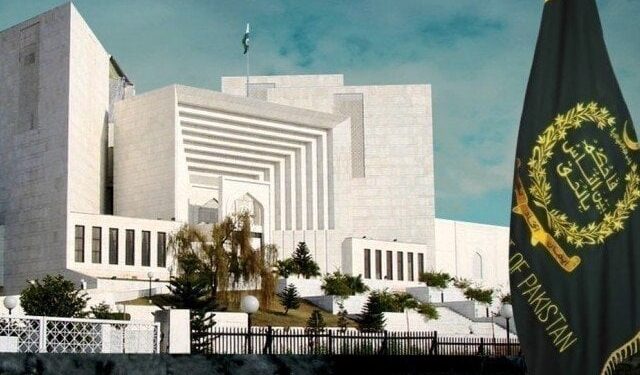Islamabad — In a significant development reflecting the evolving dynamics of Pakistan’s judicial system, the Judicial Commission of Pakistan (JCP) has approved the extension of the Supreme Court’s Constitutional Bench’s tenure by another six months, until November 30, 2025. This decision was made through a majority vote during the JCP’s latest high-level meetings held on Thursday in Islamabad.
Background of the Constitutional Bench
The Supreme Court’s Constitutional Bench was initially formed on November 5, 2024, in accordance with the 26th Constitutional Amendment. This amendment aimed to address the growing need for constitutional interpretation and timely resolution of cases involving complex legal questions impacting the fundamental structure of the state.
The bench originally comprised seven judges:
- Justice Aminuddin Khan
- Justice Jamal Khan Mandokhel
- Justice Muhammad Ali Mazhar
- Justice Ayesha A Malik
- Justice Hassan Azhar Rizvi
- Justice Musarat Hilali
- Justice Naeem Akhtar Afghan
- Justice Shahid Bilal Hassan
The initial mandate of the bench was limited to a 60-day term, with the intention of addressing a backlog of constitutional cases.
Tenure Extension and Bench Expansion
After its initial success and continued need for constitutional interpretations, the Judicial Commission extended the bench’s tenure for the first time in December 2024, granting it an additional six months.
Later in February 2025, recognizing the increasing volume and complexity of constitutional matters, the commission expanded the bench to 13 members, adding:
- Justice Hashim Khan Kakar
- Justice Salahuddin Pahanwar
- Justice Shakeel Ahmed
- Justice Aamir Farooq
- Justice Ishtiaq Ibrahim
These additions were intended to bring broader regional and judicial representation to the bench and allow more timely adjudication of constitutional petitions and interpretations.
Latest Extension and Changes in Composition
In the first of two meetings held by the JCP on Thursday, the members voted in favor of extending the Constitutional Bench’s tenure for another six months, beginning July 23, 2025, and ending November 30, 2025.
Along with the extension, the commission also updated the composition of the bench, with the nomination of:
- Justice Adnan Iqbal Chaudhry
- Justice Jafar Raza
These nominations came in place of:
- Justice Agha Faisal
- Justice Sana Akram Minhas
This reshuffle is aimed at ensuring a balanced and effective representation within the bench while also maintaining judicial diversity and specialization.
Other Key Developments in the JCP Meeting
Aside from the extension of the Constitutional Bench, the JCP discussed and approved a new policy to implement effective criteria for the annual performance review of high court judges under Article 175A(20) of the Constitution.
This article pertains to the procedures and standards associated with the appointment and performance evaluation of judges in Pakistan’s superior judiciary. The move to implement structured reviews is seen as a step toward greater accountability, transparency, and judicial reform.
Formation of a Broad-Based Committee
As part of the judicial performance initiative, Chief Justice of Pakistan (CJP) Yahya Afridi has announced the formation of a broad-based committee. This body will be tasked with drafting rules for the annual performance review of judges serving in all high courts across the country.
The committee will consist of:
- Senior judiciary members
- Parliamentary representatives
- Officials from the executive
- Representatives of the legal community and bar councils
This is being hailed as a landmark move to improve the overall judicial functioning and reduce delays in case resolution.
Second Meeting: Sindh High Court and High Court Appointments
In the second meeting held on the same day, the JCP reviewed:
- Tenure and composition of the constitutional bench of the Sindh High Court
- Plans to convene another meeting next month for considering the appointments of Chief Justices of the high courts in:
- Islamabad
- Sindh
- Peshawar
- Balochistan
This upcoming meeting will focus on finalizing the succession of leadership in these high courts and ensuring continuity and capacity in the administration of justice.
Constitutional Significance of the Bench
The Constitutional Bench plays a crucial role in Pakistan’s legal system by:
- Interpreting constitutional provisions
- Settling disputes between the federal and provincial governments
- Hearing petitions involving fundamental rights
- Providing legal clarity on constitutional amendments and laws
The continued existence and operational extension of this bench reflect the increasing complexity of constitutional litigation in Pakistan and the judiciary’s pivotal role in safeguarding democratic values, federalism, and civil liberties.
Judicial Independence and Legal Reforms
Observers note that the Supreme Court’s active role in constitutional matters under a structured bench system contributes to strengthening judicial independence. With growing public demand for faster, fairer justice, initiatives like tenure extensions, performance reviews, and judge accountability are essential reforms that reflect modern judicial governance standards.
The extension also signals the Supreme Court’s intent to clear the backlog of pending constitutional cases, especially those related to:
- Election disputes
- Judicial appointments
- Legal interpretation of executive decisions
- Fundamental rights violations
Conclusion: Toward a Stronger, Transparent Judiciary
The Judicial Commission’s decision to extend the Supreme Court’s Constitutional Bench till November 30, 2025, comes at a time of pressing judicial and political challenges. With an expanded and reshuffled bench, increased oversight mechanisms for judicial performance, and forthcoming high court appointments, Pakistan’s judicial system is poised to undergo meaningful reforms.
These developments align with global best practices in judicial transparency, constitutional governance, and the rule of law. Legal experts, civil society organizations, and the legal community at large are hopeful that such reforms will enhance public trust in the judiciary and promote efficient delivery of justice.

























